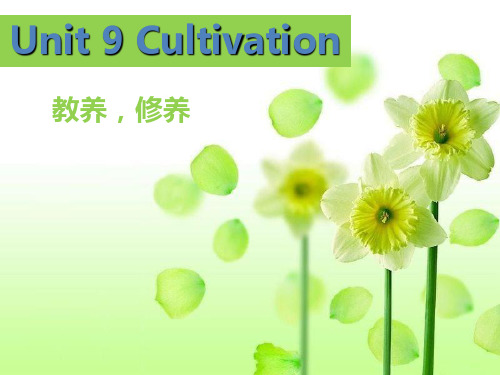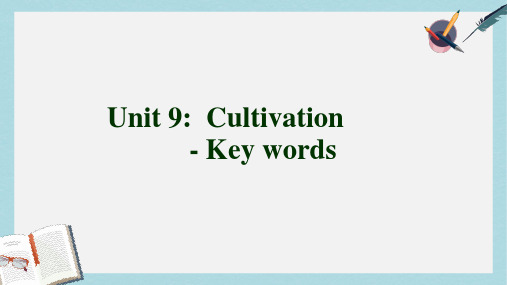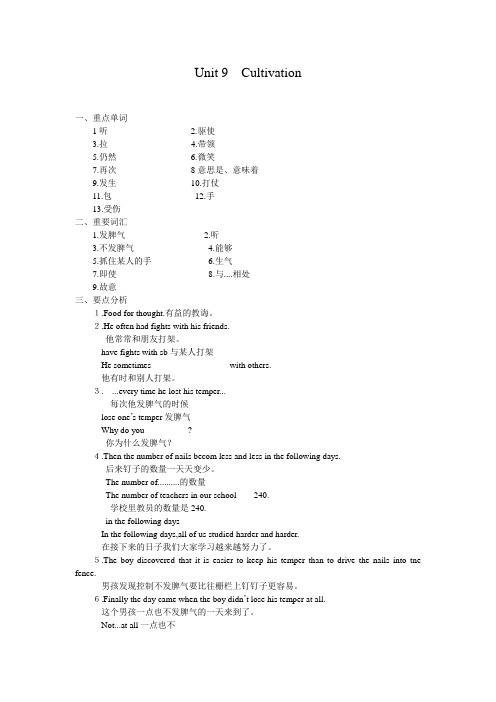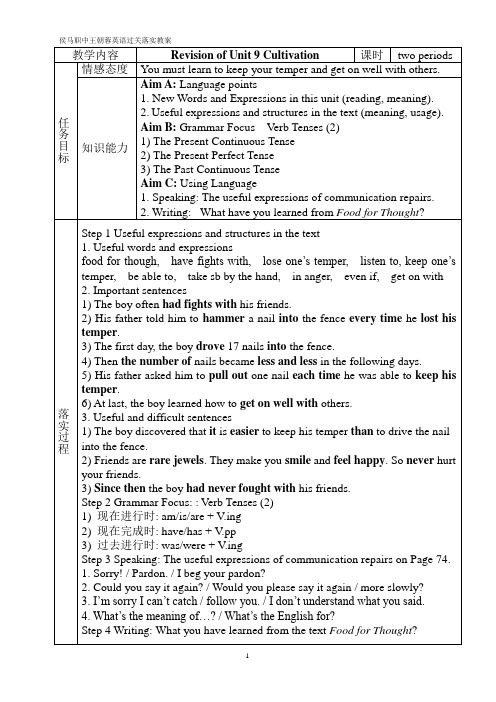unit 9cultivation整单元TMN
- 格式:ppt
- 大小:4.33 MB
- 文档页数:71

英语基础模块上册unit9cultivation全文共3篇示例,供读者参考篇1Title: CultivationUnit 9 in the English Basic Module focuses on cultivation, which is the process of preparing the soil, planting seeds, and caring for plants in order to promote growth and development. Cultivation is essential for agriculture, horticulture, and gardening, as well as for fostering personal growth and development.The Importance of Cultivation:Cultivation plays a vital role in food production, as well as in the beautification of landscapes. Without cultivation, crops would not grow properly, and gardens would not flourish. In addition to providing sustenance and aesthetic value, cultivation has numerous benefits for individuals and communities. It promotes physical activity, mental well-being, and a sense of accomplishment. Cultivation also fosters environmental stewardship, as it encourages responsible land management and sustainable practices.The Process of Cultivation:The process of cultivation involves several key steps, including preparing the soil, selecting seeds or plants, planting them, watering and feeding them, and protecting them from pests and diseases. Each step is important for ensuring the success of the cultivation process. Proper soil preparation, for example, helps plants establish strong roots, while regular watering and feeding supply them with essential nutrients. Pesticides and fungicides can be used to control pests and diseases that may threaten the health of plants.Cultivating Personal Growth:Cultivation is not only important for plants but also for individuals. Cultivating personal growth involves nurturing one's talents, skills, and potential in order to reach one's full potential. This process requires dedication, patience, and hard work, just like cultivating plants. By setting goals, developing new habits, and seeking out opportunities for growth, individuals can cultivate their personal development and achieve success in various areas of their lives.Cultivation in Education:Cultivation is also a key concept in education, where it refers to the process of nurturing students' intellect, skills, and character. Educators cultivate their students by providing them with the knowledge, resources, and support they need to succeed. By creating a positive learning environment, setting high expectations, and fostering a growth mindset, teachers can cultivate their students' academic and personal growth. Cultivation in education also involves promoting moral values, social skills, and emotional intelligence in students.In conclusion, cultivation is a fundamental process that plays a crucial role in agriculture, horticulture, gardening, and personal development. By understanding the importance of cultivation, mastering the process, and applying it to various aspects of life, individuals can grow and thrive in both their personal and professional endeavors. Cultivation is a journey of growth, transformation, and self-discovery that requires patience, dedication, and resilience. As we cultivate our gardens and ourselves, we become more connected to nature, to others, and to ourselves. Let us embrace the process of cultivation as a pathway to growth, fulfillment, and success.篇2Unit 9 CultivationIn Unit 9 of the English basic module, students will learn about cultivation, which is the process of preparing and tending to the soil in order to grow crops or plants. Cultivation is an essential part of agriculture and is crucial for providing food for the world's population. In this unit, students will learn about different cultivation techniques, tools, and practices.1. Types of Cultivation:- Traditional Cultivation: This method involves manually preparing the soil using tools such as hoes and shovels. Traditional cultivation is labor-intensive but is still widely practiced in many developing countries.- Mechanized Cultivation: This method uses machines such as tractors and plows to prepare the soil. Mechanized cultivation is more efficient and allows for larger areas of land to be cultivated in a shorter amount of time.- Organic Cultivation: This method involves growing crops without the use of synthetic chemicals or pesticides. Organic cultivation is becoming increasingly popular due to its environmental benefits and health benefits for consumers.2. Cultivation Tools:- Plow: A plow is a farming tool used to break up and turn over soil in preparation for planting. There are different types of plows, including the moldboard plow and the disc plow.- Hoe: A hoe is a gardening tool used to remove weeds and cultivate the soil. There are different types of hoes, including the Dutch hoe and the draw hoe.- Tractor: A tractor is a farming vehicle used to pull heavy machinery such as plows and seeders. Tractors are essential for mechanized cultivation.3. Cultivation Practices:- Crop Rotation: Crop rotation is the practice of planting different crops in the same field in succession. This helps to maintain soil fertility and prevent soil erosion.- Mulching: Mulching is the practice of covering the soil with materials such as straw or bark to retain moisture and suppress weeds. Mulching also helps to improve soil structure.- Irrigation: Irrigation is the process of supplying water to crops to ensure proper growth and yield. There are different irrigation methods, including drip irrigation and sprinkler irrigation.In conclusion, cultivation is a fundamental aspect of agriculture and plays a crucial role in feeding the world's population. By learning about different cultivation techniques, tools, and practices in Unit 9, students will gain a deeper understanding of how food is produced and the importance of sustainable farming practices.篇3Unit 9 Cultivation in the Basic English module focuses on various aspects of cultivation, including agriculture, gardening, and the development of skills and knowledge. In this unit, students will learn key vocabulary related to cultivation, practice their listening and speaking skills through discussions androle-plays, and engage in reading and writing activities to deepen their understanding of the topic.One of the key topics covered in this unit is agriculture. Agriculture is the practice of cultivating crops and raising animals for food, fiber, and other products. Students will learn about different types of agriculture, such as subsistence farming, commercial farming, and organic farming. They will also learn about the importance of sustainable agriculture practices in preserving the environment and ensuring food security for future generations.Another important topic covered in this unit is gardening. Gardening is the practice of cultivating plants, such as flowers, fruits, vegetables, and herbs, for aesthetic purposes or for consumption. Students will learn about the tools and techniques used in gardening, as well as the different types of gardens, such as flower gardens, vegetable gardens, and herb gardens. They will also learn about the benefits of gardening, such as physical exercise, stress relief, and connecting with nature.In addition to agriculture and gardening, students will also explore the development of skills and knowledge related to cultivation. This includes learning about the history of agriculture, the science of plant growth, and the role of technology in modern farming practices. Students will also learn about the importance of lifelong learning and continuous improvement in cultivating their skills and knowledge in this field.Overall, Unit 9 Cultivation in the Basic English module is designed to help students develop a deeper understanding of the practices, principles, and benefits of cultivation. By learning about agriculture, gardening, and the development of skills and knowledge in this field, students will be better equipped to engage with the world around them and make informed decisions about their own cultivation practices.。



Unit 9 Cultivation一、重点单词1听_______ 2.驱使_______3.拉________4.带领_________5.仍然_______6.微笑_________7.再次________ 8意思是、意味着_______9.发生_________ 10.打仗________11.包________ 12.手_________13.受伤________二、重要词汇1.发脾气_______2.听_______3.不发脾气________4.能够_______5.抓住某人的手______6.生气________7.即使_______ 8.与....相处______9.故意________三、要点分析1.Food for thought.有益的教诲。
2.He often had fights with his friends.他常常和朋友打架。
have fights with sb与某人打架He sometimes__________________with others.他有时和别人打架。
3....every time he lost his temper...每次他发脾气的时候lose one’s temper发脾气Why do you__________?你为什么发脾气?4.Then the number of nails becom less and less in the following days.后来钉子的数量一天天变少。
The number of..........的数量The number of teachers in our school____240.学校里教员的数量是240.in the following days________In the following days,all of us studied harder and harder.在接下来的日子我们大家学习越来越努力了。


七年级英语下册unit9单元知识讲解Unit9Hasureeend?单元知识讲解一重点单词和词组ver prep在……期间pret n题;作业;项目test n测验;测试false ad错误的;假的nuber n号码;编号gegraph n地理学;地理spend v度过;消磨(时间)st prn≈ad 大部分(的);最多(的)ixture n混合;混杂;混合物their prn他们的;她们的;它们的little ad很少的;少量的v烹调;烹煮hange v变;改变everne prn每个人(都);人人(都)anthing prn 任何事(物);什么事(物)haveapart 举行晚会gshpping 去购物dsereading 读书talsh 访谈节目二重点难点讲解1hatdidudvertheeeend,Lu?这是由疑问词hat引导的特殊疑问句,表示询问“干什么?”句型结构与一般现在时的特殊疑问句一样:疑问词+一般疑问句例如:Huhdidupa? 你付了多少钱?ver在这个句子里表示“在……期间”,例如:illubeatheverhristas?圣诞节期间你在家吗?2hatabuturfriend?hatabut=habut,用以询问消息或征求意见,表示“怎么样”例如:I’hungrhat/Habutu?我渴了,你呢?3little,alittle,fe,afelittle和fe表示否定,意思为“很少”或”几乎没有”;alittle和afe则表示肯定,意思为“有一点,有一些”不过需要注意区别的是:little和alittle修饰不可数名词fe和afe修饰可数名词例如:Thereislittleininbttle,anugiveealittlein?我的瓶子里没有墨水了,你能给我点儿墨水吗?Hehasfefriendshere,hefeelslnel他这里没朋友,他感觉寂寞。
Thereareafeeggsinthebaset篮子里有几个鸡蛋。